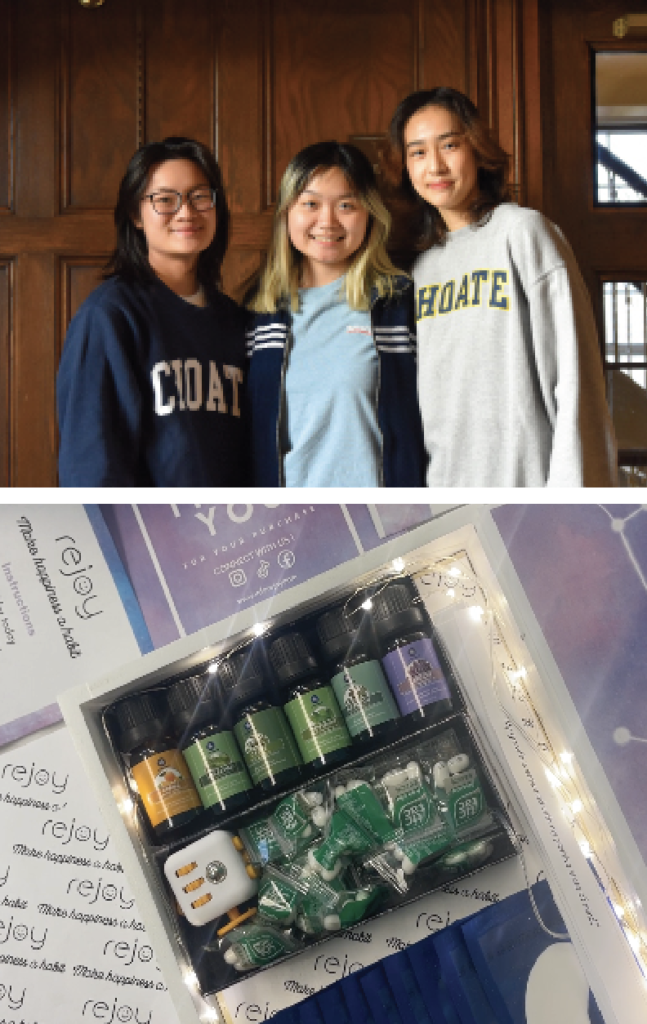
On March 7, 2022, the Distributive Education Clubs of America (DECA) announced the three winners of its Fashion Institute of Design and Merchandise (FIDM) Entrepreneur of Tomorrow Challenge. In second place were Annika Lee ’23, Isa Turri ’23, and Yoyo Zhang ’24. They had been meeting weekly since fall term to develop ReJoy, a monthly subscription box aimed at building healthy habits to combat seasonal affective disorder (SAD). Lee, Turri, and Zhang were among 125 entries for the contest, which tasks students with producing a four-minute video about a product related to beauty, health, clothing, and more.
Before settling on the idea of ReJoy, the team conducted many hours of extensive research on potential product ideas. “We researched previous winners and found the common theme was related to mental health, social justice issues, and what most of the products people did were subscription boxes or care packages,” shared Lee.
They wanted their product to address pressing issues related to their daily lives. Mental health was one of the first topics they considered both because of Choate’s limited resources towards improving the health and wellness of students the many ways wellness can be improved at Choate and as well as the lack of attention placed on mental health for teenagers in generally. Lee, Turri, and Zhang took inspiration from advent calendars as an accessible, enjoyable method for Gen-Z to build healthy habits. “For mental health, it’s recommended to do something daily, like meditating or journaling,” said Turri.
Catering to customers of different needs, the ReJoy box came in three levels, with the premium option providing daily affirmations, emoji mood-trackers, mints, and mini-goals; weekly stress-reliever and aromatherapy; as well as light therapy and access to an online community that shares healthy tips and provides emotional support.
Besides the design of the product itself, another essential component of the competition was having effective marketing strategies. To ensure that the presentation included compelling explanations about ReJoy’s target customers, promotion, and distribution, the team spent weeks devising plans on written documents.
“This whole process made me realize how important marketing is because one of the most important things is how you showcase your idea and convince your target market to buy your product,” said Turri.
The group encountered an unexpected challenge when two members contracted Covid-19 the week their project was due. Quarantining together in the health center, the two teammates “had to improvise in terms of posters, pamphlets, and decorations by using things that the health center had,” according to Lee. “At one point, we had to pull the blankets off the bed and use it as a backdrop for our video.”
In the final days before the competition deadline, Lee and Zhang managed to finish the physical prototype, media mock-up, script, and product video as Turri provided support from afar. While this obstacle deviated the team from their original timeline, they were eventually able to complete the entry on time thanks to their close friendship and effective allocation of tasks. “We had a really good dynamic because we were such close friends already,” explained Turri. “We would talk together and give tasks out depending on what we were doing that day.
Despite the challenges, participating in this competition proved to be a valuable experience, not only for the accolades it brought Lee, Turri, and Zhang, but also for the essential lessons it taught them about business and entrepreneurship.
“I learned that planning, collaboration, and marketing are very important,” described Lee when asked to summarize her biggest takeaways from the competition. “You can have a great idea, but would people buy it? You have to think about who you’re targeting,” she said. Their ability to reach their target audience proved successful, and the group was able to receive $1,000 in funding to continue developing their product.




